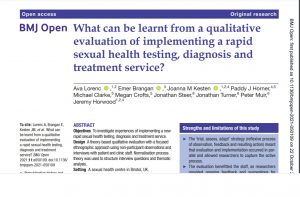Rapid sexual health testing, diagnosis and treatment service welcomed by staff and patients
25 October 2021
A rapid sexual health service designed to improve access and delivery of care is welcomed by staff and patients, National Institute for Health and Care Research (NIHR) funded researchers at the University of Bristol have found.
Demand for HIV and sexually transmitted infection (STI) testing is on the rise, but local authority budgets are shrinking. Patients typically waited over a week for chlamydia and gonorrhoea test results, and then had to return to the clinic for treatment.
The results of an NIHR Applied Research Collaboration (ARC) West funded interview-based study have been published in BMJ Open. The paper examines the experiences of implementing a first-of-its-kind rapid STI testing, diagnosis and treatment service delivered in Unity Sexual Health which provides sexual health services for Bristol, North Somerset and South Gloucestershire.
The service involves patients dropping off their samples which are then checked with new rapid testing equipment, so that results, treatment and advice can be given within hours. As most STIs do not cause any symptoms, early detection and treatment can help stop infections spreading and prevent serious disease developing.
The research team interviewed 26 patients who used the service in Bristol, and 21 staff working in the service, to find out their experiences and views. They also spent 40 hours observing the day-to-day running of the new service.
Patients valued the faster results, infection-specific treatment and avoiding unnecessary treatment. The rapid results meant that patients could be treated based on their test results, rather than being prescribed antibiotics ‘just in case’ of an infection. Staff welcomed being able to provide treatment based on results and both staff and patients valued avoiding unnecessary antibiotic prescribing. Most patients accepted the need to attend the clinic to drop samples off and return for a follow-up appointment.
The rapid testing service was successfully implemented despite funding and staff shortages. Setting up the new service required coordinated changes in practice across multiple teams.
Several small ‘pilots’ of process changes were necessary to find workable options. This responsive operating mode created challenges for delivering comprehensive training and communication in advance to all staff. Engaging all staff and changing ingrained behaviours caused some initial difficulties. Inevitable teething glitches were resolved and, overall, staff worked together to adjust and improve the new service, and morale was buoyed through observing positive impacts on patient care.
Interviews and observations revealed benefits of the new rapid results service including:
- reduced patient anxiety due to faster results and treatment
- being able to see more patients
- boosting staff job satisfaction as many were excited about doing something new to improve service access
The ARC West evaluation benefitted the staff, as researchers provided ongoing rapid feedback which prompted suggestions for service improvements and provided a space for reflection. Early evaluation of pilots of process changes played an important role in the success of the service, by rapidly feeding back issues for adjustment.
Suggestions for future service changes
These findings also provide valuable information for policymakers and healthcare professionals across the UK who may be interested in setting up similar rapid services:
- Consult with patients when redesigning services
- Involve all staff in planning, design and implementation
- Protect staff time for meetings and actions
- Document new pathways and processes early and comprehensively disseminate to staff
- Conduct pilots with a small group of staff and patients
- Use varied methods of communication about service changes that are sensitive and supportive
- Consider the impact on different staff roles and ensure staffing capacity to cover changes
Dr Ava Lorenc, Senior Research Fellow from University of Bristol Medical School and NIHR ARC West and a lead author of the study, said:
“This was an exciting study to work on, as the intervention is so new. It was great to hear first-hand the potential benefits of rapid testing and the sense of pride among clinic staff in developing this new service. Although the process was challenging for the clinic staff, it was great to see the team work together to overcome barriers and successfully implement the service”
Dr Paddy Horner, Consultant in Sexual Health and HIV from Unity Sexual Health and NIHR Health Protection Research Unit in Behavioural Science and Evaluation, who co-led the study, said:
“The implementation of the new rapid sexual health service was a massive undertaking by our clinic. The support and feedback from the NIHR ARC West qualitative research team was invaluable in ensuring its successful implementation and was highly valued by staff.”
Dr Jeremy Horwood, Associate Professor of Social Sciences and Health from NIHR ARC West and NIHR Health Protection Research Unit in Behavioural Science and Evaluation, who co-led the study, said:
“The evaluation played a vital role in the success of implementing the new service, by rapidly feeding back issues to help refine the design of the service and feeding back the positive impacts on patient care, which help boosted team morale. This demonstrates the important role rapid qualitative methods can provide in helping to improve service changes as implementation happens.”
Paper
